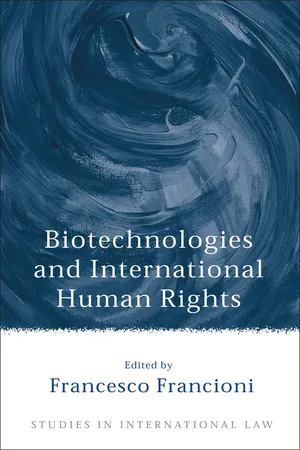
- 438 pages
- English
- PDF
- Available on iOS & Android
Biotechnologies and International Human Rights
About This Book
This book follows and complements the previous volume Biotechnology and International Law (Hart 2006) bringing a specific focus on human rights. It is the result of a collaborative effort which brings together the contributions of a select group of experts from academia and from international organisations with the purpose of discussing the extent to which current activities in the field of biotechnology can be regulated by existing human rights principles and standards, and what gaps, if any, need to be identified and filled with new legislative initiatives. Instruments such as the UNESCO Declaration on the Human Genome (1997) and on Bioethics and Human Rights (2005) are having an impact on customary international law. But what is the relevance of these instruments with respect to traditional concepts of state responsibility and the functioning of domestic remedies against misuse of biotechnologies? Are new legislative initiatives needed, and what are the pros and cons of a race toward the adoption of new ad hoc instruments in an area of such rapid technological development? Are there risks of normative and institutional fragmentation as a consequence of the proliferation of different regulatory regimes? Can we identify a core of human rights principles that define the boundaries of legitimate uses of biotechnology, the legal status of human genetic material, as well as the implications of the definition of the human genome as 'common heritage of humanity' for the purpose of patenting of genetic inventions? These and other questions are the focus of a fascinating collection of essays which, together, help to map this emerging field of inquiry.
Frequently asked questions
Information
Table of contents
- Half Title Page
- Half Title verso
- Title Page
- Title verso
- Preface
- Contents
- Table of Cases
- Table of European Legislation
- Table of National Legislation
- Table of International Instruments
- Part I: Overview and Cross-cutting Issues
- Part II: Bioethics and Human Genetics
- Part III: Economic, Social and Cultural Rights
- Part IV: Intellectual Property Rights and Trade Issues
- Part V: Participatory Rights and Remedies
- Part VI: International Humanitarian Law
- Index